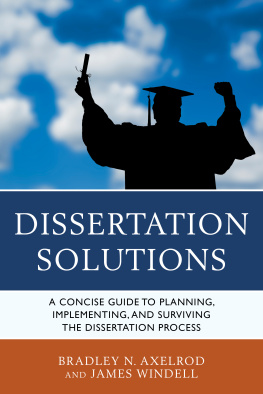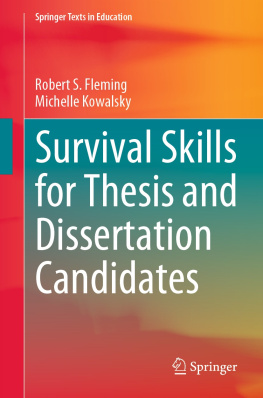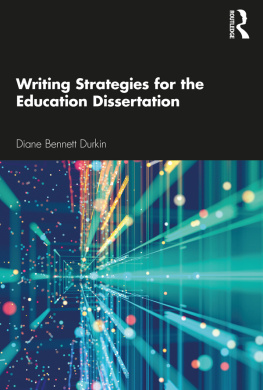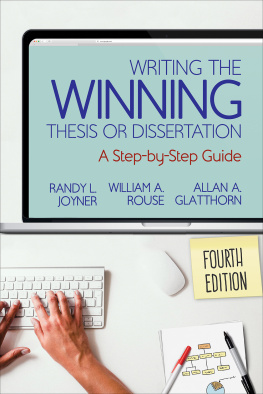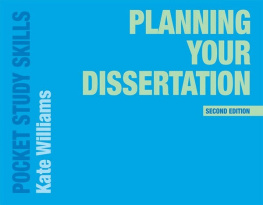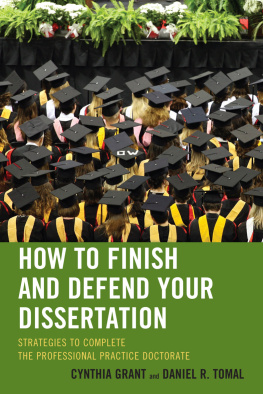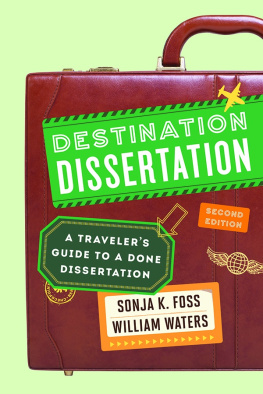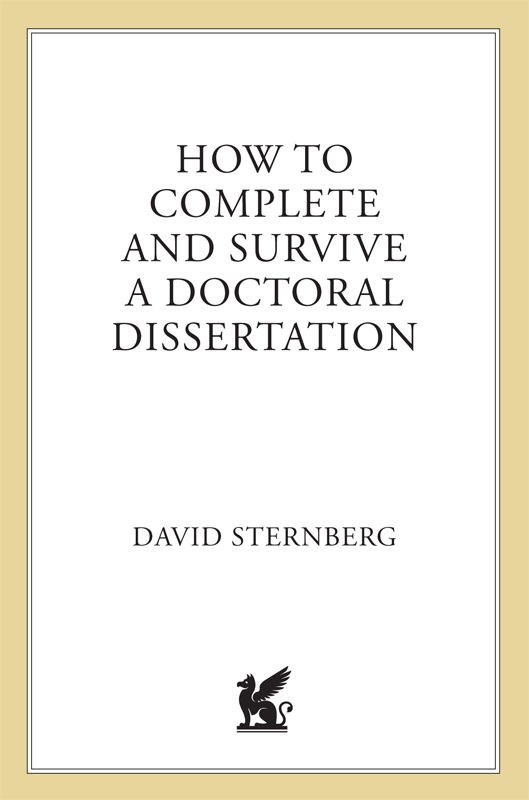Contents
Guide

The author and publisher have provided this e-book to you for your personal use only. You may not make this e-book publicly available in any way. Copyright infringement is against the law. If you believe the copy of this e-book you are reading infringes on the authors copyright, please notify the publisher at: us.macmillanusa.com/piracy.
Contents
This book is for the tens of thousands of courageous ABDs confronting the great task in the years to come.
A Finnish proverb goes, strong sisu (guts) will help get a person even through a gray rock. Now I chant Sis-u, sis-u, inside my head as I lug myself up those weary hills toward the end of a long run.
R ICHARD R OGIN , in The Runner Magazine
CHAPTER 1
The Loneliness of the Long-Distance Writer
THE DISSERTATION DOCTORATE: A LONG-STANDING AND POORLY UNDERSTOOD PROBLEM.
The status of ABD (All But the Dissertation) is the critical one in American graduate education. Since the 1960s its poignancy, sometimes permanency, has been growing. We all seem to know someonea friend, relative, spouse, colleaguewho is either filled with apprehension confronting the task fresh after completed course work or bogged down for years in stop-again, start-again efforts to finish.
Although dissertation woes are generally familiar in the context of the private lives of obscure graduate students, they have been know to obstruct revolutions and revolutionaries! Rosa Luxemburgs longterm lover and fellow political activist, Leo Jogiches, couldnt finish his dissertation, the cause of much wrangling between the two: When she moved to Berlin, Leo stayed behind in Zurich, working at an interminable doctoral thesis which he never completed. Years went by before she could persuade him to leave Switzerland and join her.
No such prolonged crisis confronts the doctoral candidate in hard/life sciences or professional degree programs, where a full dissertation (see below for a delineation of the elements defining a full dissertation) is not required. It is in the social sciences, education, humanities and letters disciplines that people have their lives disrupted and even sometimes permanently scarred by a dissertation-writing experience.
American society is not aware, excepting personal acquaintance of particular ABDs, of the almost larger-than-life trials, fortitude, despair, courage and even heroics experienced in writing a doctoral dissertation. One never sees a TV program or movie, for example, about a handicapped, disadvantaged, full-time-employed, or alcoholic-addicted person who, against all odds, completes a dissertation in political science or educational psychology. Skating championships, law and medical degrees, attainment of political office, yes; doctoral dissertations, no. Nor is there any modern fiction about people writing dissertations, depicting them as central heroic or tragic characters caught up in a great struggle, or any how-to-do-it books.
The first, and only, nonfiction book about dissertation writing I was able to find was John Almacks Research and Thesis Writing: A Textbook on Principles and Techniques of Thesis Construction for the Use of Graduate Students in Universities and Colleges, published half a century ago! This book is not without merit on the mechanical side of thesis construction, but, reflecting its times, it says absolutely nothing about the structural/bureaucratic and emotional dimensions ringing dissertation writing. It seems long overdue for a book on writing a dissertation in tune with its time, when such a project has to be understood to be as much of an emotional and human relations enterprise as an exercise in library research, hypothetheses construction, and gathering and analysis of data. Although not slighting the mechanical aspects of the dissertation, the greater weight of the present volume is toward sociological and personal issues that the dissertation writer must confront and master.
The frequency of the ABD status has become so large that it has been legitimated in its own right: Professional journals, like the Employment Bulletin of the American Sociological Association, frequently contain openings for an instructor or assistant professor to teach introductory and family courses: ABD, or, will consider M.A.; prefer ABD. A recent perusal of the Sunday New York Times Careers in Education section indicated the ABD status as an acceptable credential for teaching positions in history, psychology, human relations, bilingual-teacher education and English-language studies.
Implicit in these offerings is the understanding that one will soon get his doctorate or not be retained beyond a limited number of reappointment years in the teaching position, but understood as well is the hard fact that many will never complete the dissertation. A social science trade joke, recognizing the limited mileage of the ABD, goes, An ABD and fifty cents will get you a cup of coffee.
In the last years of the 1970s colloquia/workshops on How to Write a Doctoral Dissertation were held at major metropolitan New York graduate centers, including New York University and City University of New York (CUNY). All sessions played to standing-room-only crowds of graduate students. In March of 1980 Kingsborough Community College of CUNY advertised in The New York Times for a major doctoral-candidate workshop dealing with problems like writers blocks, oral examinations, statistical analysis and publishing professional articles. In May 1980 the following advertisement appeared in The New York Times: Doctoral Candidates. Cant get that dissertation off the ground? Enroll in intensive workshop, June 57 Leave workshop with a detailed draft of your proposal. Limited to 7. This last workshop appears much closer to a business venture than the other more academic, nonprofit, sponsored ones. Profit-oriented dissertation counseling, probably involving no small measure of actual thesis writing, appears to be growing in response to the desperation of many ABDs.
Most social science and some humanities doctoral programs themselves schedule (often require) anticipatory socialization for students near the end of their course work in the form of routine thesis prospectus or dissertation seminars, but veterans of these efforts are nearly unanimous in evaluating them as very little help for the great task. (Read on for reasons why in-department forums are ineffective.)
This book is intentionally entitled: How to Complete and Survive a Doctoral Dissertation. Two potential emotional/career nightmares face the ABD: Not to finish is practically to guarantee a years-long, if not lifelong, mood of a flawed or somehow incompleted life, where the ABD is constantly explaining/rationalizing to others (e.g., university employers, colleagues, friends, spouses, lovers, family) and to himself just why he didnt finish. The emotional energy expended in often decades-long apologizing and soul-searching is incalculably debilitating and humiliating.
On the other hand, I have often heard ABDs remark (indeed, sometimes said it myself), If only I could finish my thesis, my troubles would be over. Although such a statement has some validity, finishing often scars the successful laureate as well: All along the dissertation course, from initial topic selection and proposal to defense, are strewn potential dangers to self-preservation (dignity), inter alia, a sadistic (or lecherous) professor on ones committee; selling your soul to a committee which wont pass your thesis unless you excise what you consider to be its (and thus your) guts or add what you judge to be anathema; situations where the fieldwork data contradicts ones hypotheses and causes one to feel (wrongly, as the book will show) that the alternatives are either giving up the project or fudging the data; lying to or manipulating (thus depersonalizing) your sample in order to get data deemed absolutely essential for the thesis.


